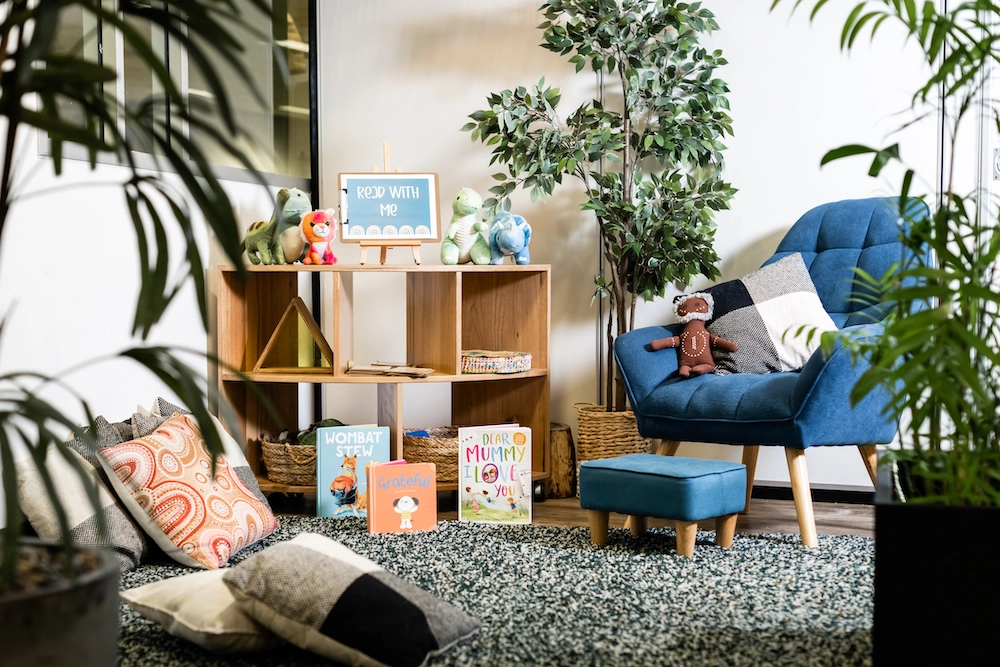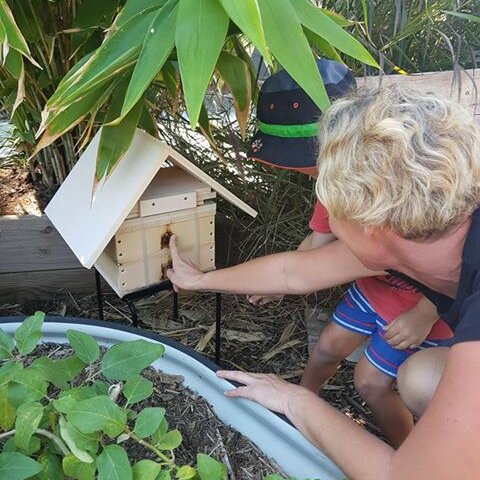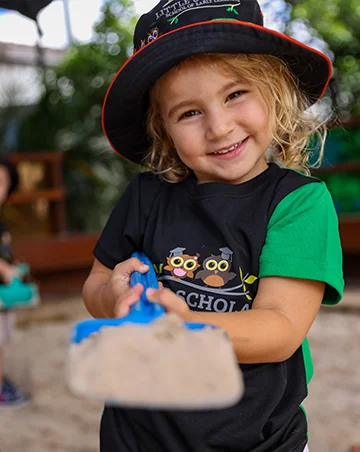Dropping off your little angel at an early childhood centre for the first time can be understandably daunting. You leave your child with strangers and wonder if they will get the same amount of care and attention that you give them at home.
As a concerned and nervous parent, you can make it easier on yourself by asking an early learning centre a number of questions before you enrol your child. These questions will ensure you choose childcare that you can trust and that will go over and above to support your child’s development.
Questions to ask an early learning centre
Is the centre secure?
It’s important to know whether or not a centre has adequate security protocols such as methods to sign in and out, authorising who can sign children in and out as well as security systems to enter the centre via pin code.
At Little Scholars, safety is paramount. All centres are secure and can only be accessed using a pin. Only parents and guardians authorised on our Little Scholars App can drop and collect children. All educators pay close attention to children at all times, and all centres are fitted with security entry and exit points.
What is included in my childcare fees?
The childcare fees are just one of the factors that determine how much childcare subsidy you receive so it’s a good idea to ensure you’re getting value for money. Ask whether the childcare centre provides all meals, nappies and other extracurricular activities for the children.
At Little Scholars, childcare fees include three-course meals, snacks and beverages, nappies where required, linen and extra-curricular activities.
Link to childcare subsidy article
At Little Scholars, childcare fees include three-course meals, snacks and beverages, nappies where required, linen and extra-curricular activities.
If food is supplied, who determines the meals and are they healthy?
For little growing bodies, a healthy and varied diet is crucial. Ask to see the weekly menus and question how the menu is developed, i.e. does it follow any guidelines? If your child has an allergy or intolerance, it’s important to ask if these are catered for and if the centre has policies to ensure no cross-contamination of food.
At Little Scholars, we have a six-week rotating menu to offer the children balance and variety. The menu has been created to meet 50 per cent of the children’s dietary requirements, this is recommended by ‘Australian Dietary Guidelines, an Australian Guide to Healthy Eating, Get Up & Grow: Healthy Eating and Physical Activity for Early Childhood’ and the National Quality Framework (NQF). Our menu is also endorsed by Nutrition Australia.
What are your centre’s values?
It wouldn’t make sense to place a child in a centre that didn’t replicate the same values as you share with your family. Ask the centre about the values they aim to embrace and request their values statement.
At Little Scholars, we are dedicated to our philosophy which is to provide a high standard of care and education within an environment that is both trusting and homelike. You can read our philosophy here.
Do you have a stimulating curriculum for the children?
Of course, you want to make sure your child isn’t sitting around doing nothing each day and that they enjoy stimulating activities that have been planned to offer variety and the opportunity to learn and explore.
At Little Scholars, our qualified educators plan experiences that involve both indoor and outdoor play, with the outdoor area designed to be an essential part of each centre. Providing stimulating and challenging experiences is an integral part of our curriculum to help children become effective learners. Play is a massive part of our learning environment which enables children to express their creativity and emotions.
Is the centre licensed and assessed under the National Quality Framework?
Early childhood centres are required to base their programs on an approved learning framework which addresses a child’s developmental needs, interests and experiences while considering individual differences.
At Little Scholars, we aim to exceed the National Quality Framework across all of our centres. Each centre has a quality improvement plan in place to continually achieve this high level. The plan covers areas such as programs and practice, health and safety, physical environment, educator arrangements and relationships with children, families and communities.
What is the educator to child ratio?
It’s vital that educator to child ratios are met so that there is flexibility to respond to the needs of the children. The National Quality Framework (NQF) outlines required educator to child ratios here.
At Little Scholars, we take the NQF very seriously and adhere to the educator to child ratio at all times. Each centre is headed by a Centre Manager with years of experience in early childhood and who will always ensure adequate numbers or skilled educators are caring for your children.
Will my child be supported during the transition from kindergarten to Prep?
The transition from kindergarten to Prep is a huge one emotionally and academically which is why it’s essential that centres have a program in place to support children.
At Little Scholars, we have a curriculum program that is aimed at building confidence and independence. We enjoy specialised activities that help prepare a kindy child for Prep and we work with parents to develop a custom learning program. We also partner with local schools and hold regular excursions so children can become familiar with the ‘big school’ environment.

Is there room for quiet play if children need it?
Early learning centres can be a hive of activity, colour, noise and movement. This can be overwhelming for some children which is why it’s important that a centre has space for quiet play if a child needs it.
At Little Scholars, our centres have been designed with different indoor and outdoor spaces and themes, keeping in mind the diverse interests and needs of each child. These spaces include areas for quiet play that your child can access when they need it.
How much time do children spend outdoors at your centre?
There are so many benefits of outdoor nature play which is why it’s important to ask about it. For children from 1-5 years old, it’s recommended to have three hours of outdoor play spread over a day. In addition to asking about outdoor play being part of the curriculum, ask about the outdoor environment and what opportunities for play are at the centre. Lastly, outdoor play means being sun smart so don’t forget to ask about the centre’s sun protection policies too.
At Little Scholars, the outdoor environment is an essential part of the children’s learning journey; babies, toddlers and kindergarten children all enjoy the outdoor areas at our early childhood centres. Playgrounds at our centres have been specifically designed for the development of coordination, balance and strength. Mud pits, waterways, riverbeds, vegetable gardens, grassy areas and bike tracks are just a few of the inviting opportunities for children at our centre to play outdoors and reap the benefits . We also have a Bush and Beach Kinder program where we take children to the bush or beach to interact with the beautiful surrounds.
Are toys, play areas and equipment safe and not damaged?
Some centres have limited funds for the upkeep of equipment or to purchase new equipment which is why it’s always a good idea to ask and take a look. It’s also a good idea to ask if regular checks are made to ensure the equipment is safe.
At Little Scholars, our centres have the latest and brand new resources, equipment and furniture. It’s our goal to ensure that children are learning and playing with the best. But even though the equipment is new, we run thorough checks daily during set up and pack up.
Will there be structure and routine for my child?
Structure and routine are absolutely essential for young children; they thrive on it. Having structure and routine is also known to reduce the occurrence and severity of toddler tantrums. Ask to see a usual daily routine and whether or not this is maintained each day to avoid too much change.
At Little Scholars, we carefully structure each day to allow time for individual play, play in small groups and large group play. Language and literacy skills are developed during these play times as well as when the children enjoy story time, drama, poems, songs and games. We maintain the same structure and routine as much as possible because we know how much this can impact on eating and sleeping habits.
Are there health and safety procedures for when accidents occur?
Falls, scrapes, scratches, knocks to the head…they all happen when young children are finding their feet, taking risks and getting to know each other, but there still needs to be a process in place to deal with and report these incidents. In particular, if your child has an allergy, ask the centre to show you how the allergy is communicated throughout the centre and the process taken in the case of an allergic reaction, e.g. administering an EpiPen. Also, request to see evacuation procedures in the case of fire and emergency and how regularly these procedures are practised.
At Little Scholars, we have in-depth health and safety procedures for emergency and accident situations. These procedures are reviewed regularly, all educators are trained in these procedures, and emergency evacuation or lockdown drills carried out with educators and children. We are always more than happy to discuss these procedures with parents and guardians.
What extra-curricular activities are available at the centre?
Beyond play, extra-curricular activities are essential for confidence-building and to grow a child’s interests. Ask which activities are offered at the centre and whether or not they are included in the fee.
At Little Scholars, music, yoga, sport, cooking and language lessons are all included in the fee and enable children to engage in activities they may not otherwise have access to. We find these extra activities help children discover a whole lot more about themselves.
Not every early childhood centre is created equal which is why it’s a smart move to arm yourself with these questions when looking to enrol your child. You’ll feel much better about your child starting at a new centre when you’ve asked the really important questions.
Have more questions about the Little Scholars early childhood centres? Give us a call!



